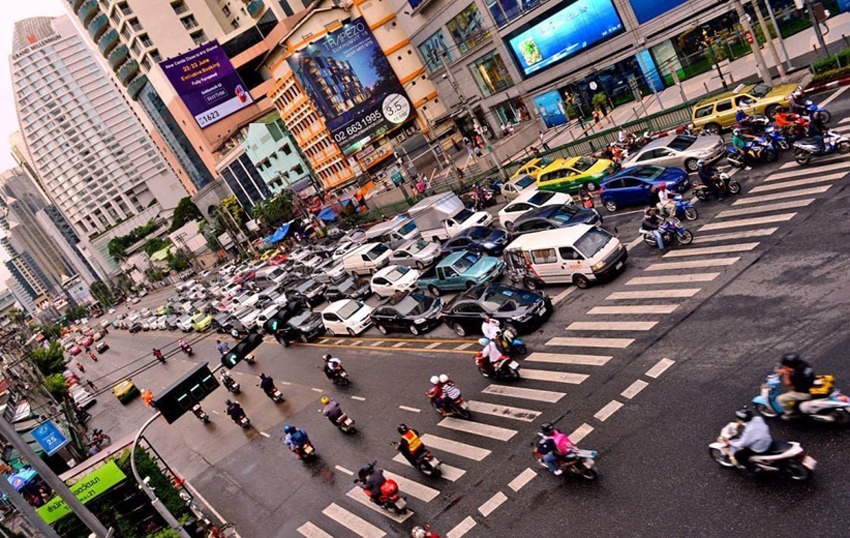Thailand, Singapore Most Vulnerable To Potential US Recession

Image: Collected
Southeast Asia could be seriously affected in case the US falls into recession, but some countries would be more badly hit than others, economists told news portal CNBC.
The US has already reported two consecutive quarters of negative growth in the first two quarters of 2022, what some consider a “technical” recession, the report said, noting that the potential for a full-blown recession it there.
In Southeast Asia, Singapore and Thailand will most likely be the first to be hit if the US cannot recover from the downtrend.
Small, export-oriented economy
The city state is also extremely connected with the rest of the world and a “shock wave” in any country will definitely have a ripple effect, Irvin Seah, senior economist at DBS Group Research told CNBC.
Thailand’s tourism dependence
Thailand will also be one of the first to be impacted if the US falls into a recession as the country relies heavily on tourism for its economic growth.
Tourist spending accounted for approximately 11 per cent of Thailand’s GDP in 2019, but unofficially certainly much more, before the Covid-19 pandemic. The country welcomed almost 40 million visitors that year and generated more than $60 billion in revenue, according to World Bank data.
But there were just about 428,000 foreign tourist arrivals in 2021, and the country’s economy grew by only 1.5 per cent, one of the slowest rates in Southeast Asia, according to Reuters. In 2022 until September, just five million foreign visitors arrived.
Chinese could come to the rescue
Thailand could be next to fall into a recession after Singapore, according to Chua. However, a “wildcard” would be the timing of China’s reopening, which could determine if the Thai economy comes back “in full swing,” he added.
“As long as Chinese tourists are not returning, Thailand will continue to struggle. Growth has been weak, inflation is high, the Thai baht is under pressure,” he said.
Thailand’s inflation rate is another problem as it hit a 14-year high of 7.66 per cent in June, according to data from financial market intelligence firm Refinitiv.
Indonesia, Philippines in better position
In turn, Chua noted that Indonesia and the Philippines would likely be less impacted by a potential US recession due to their “domestic oriented economies.”
“Indonesia and the Philippines have been more insulated from slowing external demand and US recession, with both economies continuing to expand even in 2008/09 during the global financial crisis,” he said.
The US has already reported two consecutive quarters of negative growth in the first two quarters of 2022, what some consider a “technical” recession, the report said, noting that the potential for a full-blown recession it there.
In Southeast Asia, Singapore and Thailand will most likely be the first to be hit if the US cannot recover from the downtrend.
Small, export-oriented economy
Singapore is “more vulnerable” than its regional peers because its small economy is “very, very dependent” on exports, said Chua Hak Bin, a senior economist at Malaysia’s Maybank Singapore branch. Singapore does not have much of a domestic market and relies heavily on trade services for economic growth, Chua explained. This includes shipping activities and cargo operations.
Thailand’s tourism dependence
Thailand will also be one of the first to be impacted if the US falls into a recession as the country relies heavily on tourism for its economic growth.
Tourist spending accounted for approximately 11 per cent of Thailand’s GDP in 2019, but unofficially certainly much more, before the Covid-19 pandemic. The country welcomed almost 40 million visitors that year and generated more than $60 billion in revenue, according to World Bank data.
But there were just about 428,000 foreign tourist arrivals in 2021, and the country’s economy grew by only 1.5 per cent, one of the slowest rates in Southeast Asia, according to Reuters. In 2022 until September, just five million foreign visitors arrived.
Chinese could come to the rescue
Thailand could be next to fall into a recession after Singapore, according to Chua. However, a “wildcard” would be the timing of China’s reopening, which could determine if the Thai economy comes back “in full swing,” he added.
“As long as Chinese tourists are not returning, Thailand will continue to struggle. Growth has been weak, inflation is high, the Thai baht is under pressure,” he said.
Thailand’s inflation rate is another problem as it hit a 14-year high of 7.66 per cent in June, according to data from financial market intelligence firm Refinitiv.
Indonesia, Philippines in better position
In turn, Chua noted that Indonesia and the Philippines would likely be less impacted by a potential US recession due to their “domestic oriented economies.”
“Indonesia and the Philippines have been more insulated from slowing external demand and US recession, with both economies continuing to expand even in 2008/09 during the global financial crisis,” he said.
Source: https://investvine.com
Previous Story
- Singapore's core inflation falls to 4.2% in June
- Singapore Turf Club staff speak of shock, disappointment...
- Abu Dhabi's Injazat signs initial pact with Singapore's...
- Singapore: No more quarantine for fully vaxxed travellers...
- Singapore to impose sanctions on Russian banks and...
- HSBC set to acquire India’s L&T Investment Management...
- Asian stocks fall on concern about virus, tighter...
- Dyson Award winners: Glaucoma glove and bottle scanner